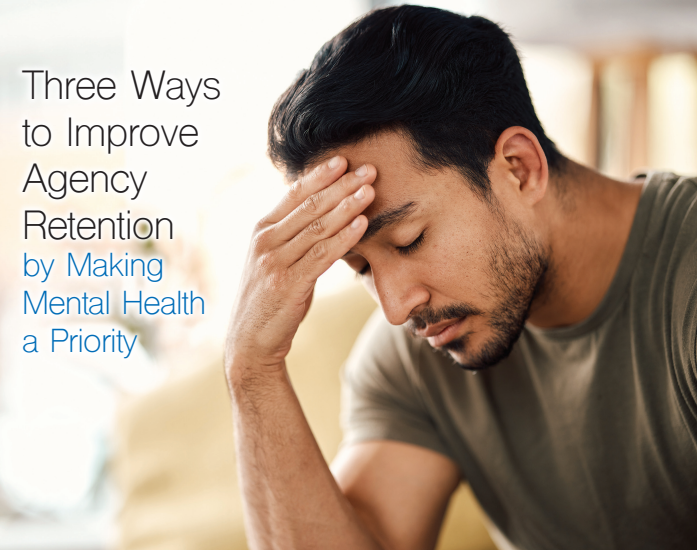|
It’s no secret that working in law enforcement has become increasingly difficult in the last several years. Between the stress of the pandemic and the public’s growing distrust of police officers, people aren’t exactly lining up to join their local police department. Unfortunately, officers have had it tough for decades. It’s stressful to be thrust into scenarios where your life is in danger. Being routinely exposed to traumatic situations such as car accidents, homicides, and domestic violence can quickly take a toll on an officer’s mental health. According to the National Alliance on Mental Illness, nearly one in four officers have had thoughts of suicide at one point, and those in law enforcement report higher rates of PTSD, depression, and anxiety than the general public. Further compounding this issue is the stigma around receiving help for mental-health concerns.
A 2020 study on the prevalence of mental-health struggles among officers in the Dallas Police Department found that 26 percent of participants screened positive for a mental illness, yet only 17 percent of those individuals sought out mentalhealth services. This alone is a significant problem within law enforcement, but now, mental-health issues are being exacerbated by a nationwide decline in officer retention. A study conducted by the Police Executive Research Forum found that when comparing hiring practices in 2020-21 to 2019-20, agencies experienced a five-percent decrease in hiring, an 18-percent increase in resignations, and a 45-percent increase in retirement. This leads to a lack of adequate staffing, which often results in officers working longer shifts and taking on more responsibility within their department. This added stress takes a toll on an officer’s mental health, leading to burnout and resignation, and creates a seemingly never-ending cycle. Supporting Your Officers Agencies struggling with retention frequently turn to new recruiting methods to address staffing issues. However, it’s necessary to realize that keeping your officers is more important than attracting applicants only to have them resign a few years into their careers. Departments that promote a positive culture around mental health may find that the prevention and treatment of burnout, PTSD, and other mental health struggles goes a long way toward both attracting and retaining officers. Here are three ways your department can make mental health a priority and simultaneously improve officer retention: 1. Lead by Example In any profession, leaders need to follow through with the messages they communicate to their team. When it comes to the mental health of lawenforcement officers, normalizing mental-health issues can truly save an officer’s life. The acceptance of mental-health struggles must be modeled from the top down, and can be accomplished through a multifaceted approach. First, those in command should be willing to share their own mental-health struggles with others in the agency. While this vulnerability can feel scary at first, there’s nothing more powerful to someone dealing with PTSD or depression than to hear they aren’t alone. Remember, mental-health issues are common within the law-enforcement community, and regular discussions to help remove stigmas and normalize these periods of struggle should happen regularly. You don’t need to hold formal meetings to shift the culture of your department, as informal conversations can provide the safety needed for officers to open up. When it’s apparent that your department supports officers in times of need, attracting applicants will become easier. Those already on the force will feel empowered to put their all into their work, knowing they have others looking out for their mental health. 2. Take a Collaborative Approach The ability for officers to speak with those in leadership about their mentalhealth concerns is a huge step toward eliminating any stigmas present in your department. However, those in administration can’t be the only ones available to support officers when they need to talk. Many departments have implemented peer support groups to encourage conversations about traumatic events or simply talk about feelings of being overwhelmed. To complement peer encouragement, agencies can also establish an employee assistance program. This type of confidential counseling service can provide valuable feedback about mental-health concerns from a more neutral perspective. Officers are sometimes hesitant to share their mental-health struggles in a peer setting for fear of being seen as weak. To help eliminate this concern, Congress passed the Confidentiality Opportunities for Peer Support Counseling Act in 2021. It ensures best practices will be established for peersupport programs and keeps information shared during these sessions confidential. No matter what combination of resources your agency uses for mentalhealth support, officers should be encouraged to use these programs as needed. By taking a proactive approach and learning how to cope with stress before it becomes a chronic concern, officers have a better chance of building the resiliency needed to remain on the force. 3. Know How to Respond to Trauma- Being a police officer is often described as mostly mundane with bursts of extreme stress. In some instances, these stressful situations are traumatic and leave officers in a position of needing ongoing mental help. While mandatory counseling and peer support can be beneficial after a traumatic event, some officers find that specialized treatment programs provide the assistance they need to be able to return to work. These organizations, such as Caron Treatment Center, can also help with ongoing mental-health illnesses. Officers need to know they aren’t alone when it comes to mental-health struggles, as depression, burnout, and PTSD are normal given the situations law-enforcement personnel are regularly exposed to. No officer is exempt from mentalhealth issues, whether they’ve been on the force for two years or 20. Ultimately, it’s up to each agency to put programs in place that will foster a positive attitude toward mental health and assist officers when they need it most. -This article was originally published by Police1 and is reprinted here with permission
0 Comments
|
AuthorCourtney Levin ArchivesCategories |
CONTACT
P.O. Box 1241 • Appleton, WI 54912
(877) 325-COPS (2677)
www.LECF-Inc.org
501(c)(3) EIN 81-1594518
(877) 325-COPS (2677)
www.LECF-Inc.org
501(c)(3) EIN 81-1594518

 RSS Feed
RSS Feed
